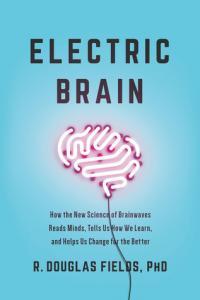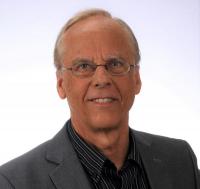
R. Douglas Fields: Electric Brain
HOW THE NEW SCIENCE OF BRAINWAVES READS MINDS,
TELLS US HOW WE LEARN, AND
HELPS US CHANGE FOR THE BETTER
R. Douglas Fields, PhD
BenBella, February 4, 2020, $26.95
ISBN-10: 1946885452; ISBN-13: 978-1946885456
Fields reports:
As a neuroscientist, I was stunned when I first heard the revolutionary advances in monitoring and manipulating electrical activity in the brain. That happened over five years ago when I attended a meeting of scientists doing brain research funded by the Office of Naval Research.
The researchers reported astounding abilities to use brainwave analysis and brain imaging to read people’s thoughts, transmit information from brain-to-brain, expose neurological and psychological illness, assess a person’s innate cognitive abilities and predict their aptitude to learn specific types of information, couple the human brain to computers, and more.
Neuroscience had crossed a threshold that will transform medicine and change society in profound ways. I began visiting these scientists’ laboratories to learn more, writing articles for Scientific American and ultimately this book.
I sensed a deeper mystery beneath the science. The discovery of brainwaves is arguably the most important discovery in modern neuroscience. Why is the name of Hans Berger, the German psychiatrist who discovered human brainwaves in 1924, not well known? What motivated Berger to think that waves of electromagnetic energy radiated out of a person’s head? What did he think he had discovered, and how did other scientists react? Why did he keep his discovery a secret for five years? Why was there no Nobel Prize?I traveled to Germany, Italy, Spain, and elsewhere to see the lab notebooks and what remained of the equipment from pioneering scientists working on brainwaves in the late 19th and early 20th centuries. I learned that the long-accepted story that Berger committed suicide in reaction to Nazism was false. The truth involves a tangle of science and society, intertwined with Nazi atrocities. Berger was a Nazi supporter who oversaw forced sterilizations of mental patients in the hospital he ran.
Andrew Stuart, my agent on my previous books, was instrumental in developing the proposal and in finding the right publisher for Electric Brain. My advice for aspiring authors is to pick your projects carefully, because writing a book will consume every minute of your spare time and energy.
Contact info:
- R. Douglas Fields, 301-480-3209, douglas.fields@gmail.com, http://rdouglasfields.com, @rdouglasfields1
- Book website: https://www.benbellabooks.com/shop/electric-brain/
- Publicist: Lindsay Marshall, 214-750-3600, ext. 107, lindsay@benbellabooks.com
- Agent: Andrew Stuart, 646-564-2983, andrew@stuartagency.com
NASW members: will your book be published soon? Take advantage of this opportunity for shameless self-promotion. Submit your report for Advance Copy.
Tell your fellow NASW members how you came up with the idea for your book, developed a proposal, found an agent and publisher, funded and conducted research, and put the book together. Include what you wish you had known before you began working on your book, or had done differently.
See https://www.nasw.org/advance-copy-submission-guidelines.
View Advance Copy archives at https://www.nasw.org/member-article/advance-copy.
Thinking of writing a book? If you are a NASW member, you may access a list of more than 150 books and online resources to help you craft your book proposal, find an agent and funding sources, negotiate your contract, learn about self-publishing, publicize and market your book, and more at https://www.nasw.org/article/write-book.
Send book info and questions about book publishing to Lynne Lamberg, NASW book editor, llamberg@nasw.org.
Hero image by Eli Digital Creative from Pixabay
Advance Copy
The path from idea to book may take myriad routes. The Advance Copy column, started in 2000 by NASW volunteer book editor Lynne Lamberg, features NASW authors telling the stories behind their books. Authors are asked to report how they got their idea, honed it into a proposal, found an agent and a publisher, funded and conducted their research, and organized their writing process. They also are asked to share what they wish they’d known when they started or would do differently next time, and what advice they can offer aspiring authors. Lamberg edits the authors’ answers to produce the Advance Copy reports.
NASW members: Will your book be published soon? Visit www.nasw.org/advance-copy-submission-guidelines for information on submitting your report.
Publication of NASW author reports in Advance Copy does not constitute NASW's endorsement of any publication or the ideas, values, or material contained within or espoused by authors or their books. We hope this column stimulates productive discussions on important topics now and in the future as both science and societies progress. We welcome your discussion in the comments section below.





